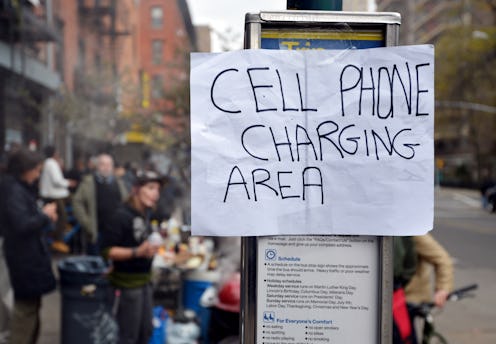
On Friday night, Hurricane Harvey hit Texas with brute force. Though it's downgraded to a Category 1 hurricane since then, keeping your line of communication open is still important, especially if you're in the storm's path. There are few different ways you can make your cell phone battery last during Hurricane Harvey.
If you already have a portable charger or extra phone battery handy, keeping them close is your best option. If you don't own a portable charger, you may be able to pick one up at a grocery store or gas station, though there's no guarantee that any will be open during the storm, especially if there are power outages. If you don't own a portable charger or car charger and are unable to buy one, ask a neighbor, friend, or family member.
Another option is finding a local hurricane shelter, which may have a portable charger available for you in the case that the power goes out. To find a shelter nearby, you can visit the American Red Cross website and type your address or town into the disaster shelter finder. Once you find an outlet and your phone is 100 percent charged, keep it plugged in for as long as you can.
If you're experiencing power outages and wall sockets aren't an option, find a charged laptop and plug your phone into that.
Aside from finding ways to charge your phone if it's dying, there are also little steps you can take to ensure your phone stays charged for longer. For example, you should turn off your phone's "radios," which include things like wifi and bluetooth. On top of that, you can shut down all apps, turn down your screen's brightness, and avoid sending texts and making phone calls unless it's absolutely necessary. If you know you won't be receiving calls or making them for even just an hour, put your phone on airplane mode for that time.
Though the storm has weakened since it made landfall, don't let your guard down just yet. So far, over 250,000 people in Texas are without power and it could get worse. Heavy rainfall is expected to cause additional damage, so having your phone with you — and keeping it charged — in case of an emergency could be a lifesaver.